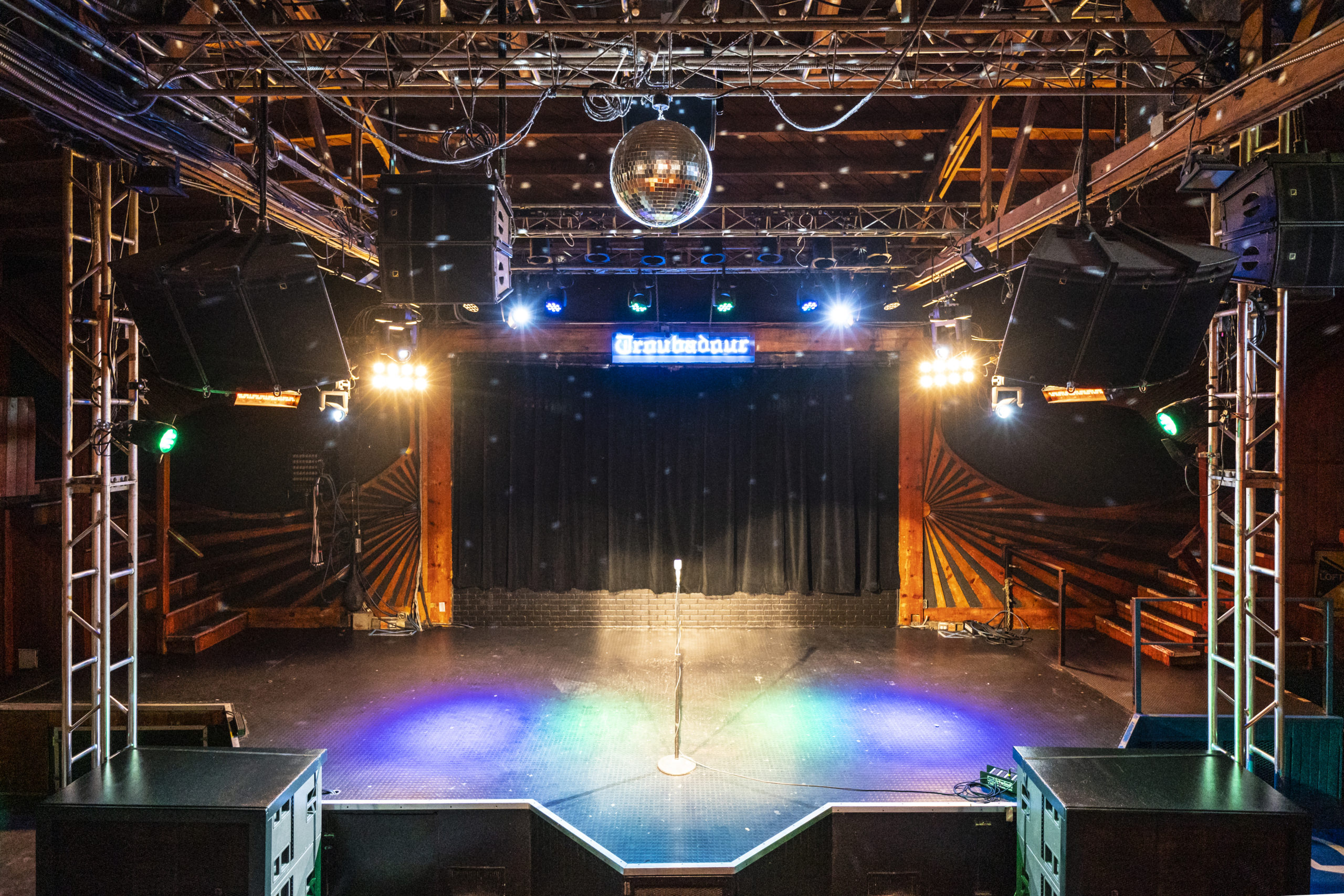This article appears in FLOOD 11: The Action Issue. You can purchase the magazine here. All proceeds benefit NIVA (National Independent Venue Alliance) and their efforts to save independent venues across the United States. #SaveOurStages
America’s independent music clubs and theaters have been dying one by one since the onset of the COVID-19 pandemic, and those that have managed to survive are at death’s door. It will take an act of Congress and that indecipherable slash of a Trumpian pen stroke to save them.
The pandemic has fostered a certain solidarity in clubland, as evidenced by the creation of the National Independent Venue Association (NIVA). It’s an organization of roughly two thousand independent venues across the nation, formed in the wake of the massive entertainment world shutdown in mid-March and the immediate loss of income for anyone connected to that world—club owners and employees, talent buyers, booking agents, caterers, doormen, and, obviously, the bands. The Paycheck Protection Program (PPP) and the Coronavirus Aid, Relief and Economic Security (CARES) act helped some club owners and employees tread water this spring, but that’s about it.
As of this writing, there are two bipartisan, potentially industry-saving bills in front of Congress (which has recessed for August): RESTART and Save Our Stages. RESTART was first out of the gate, a June bill co-sponsored by Sen. Michael Bennet (D-CO) and Sen. Todd Young (R-IN), which would offer partially forgivable loans to small businesses (like music venues) that have experienced a greater than 25 percent drop in total income since the shutdown. Save Our Stages, co-sponsored by Sen. John Cornyn (R-TX) and Sen. Amy Klobuchar (D-MN), was introduced in the Senate in July, and would award grants to eligible venues.
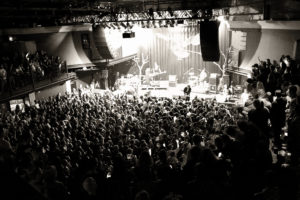
Courtesy 9:30 Club
“Both acts have components that would fit our needs,” says NIVA spokeswoman Audrey Fix Schaefer, who is also Head of Communications for the D.C.-area venues I.M.P., 9:30 Club, Lincoln Theatre, the Anthem, and the Merriweather Post Pavilion. “Congress negotiates what goes into the overall bill. I can’t predict what will happen, and people who’ve made law for the last 25 years cannot predict what will happen.”
“Save Our Stages is similar to RESTART in the way it identifies the business, but is more industry-specific,” adds Tobi Parks, the owner and talent buyer for xBk in Des Moines, Iowa, a 250-capacity club that opened last September. (The name of the club stands for ex-Brooklyn, where Parks hails from.) “Instead of a loan, it is going to be a lifeline. Any pure grant is going to face some hurdles. But if you look at the bank and airline industries, ours is a tiny drop in the bucket, looking for $10 billion compared to hundreds of billions.”
It’s a situation that affects not just the venues, of course, but all those connected to them. “We’re a magnet for other economic activities,” says Schaefer. “People who come to a show have dinner before or drinks afterwards. For every dollar spent on a ticket in a small venue, twelve dollars of economic activity is generated, considering the caterers for the act, other restaurants, transportation, and other things. The federal government assisting us is an investment—not just in keeping our industry from folding, but other businesses as well.”
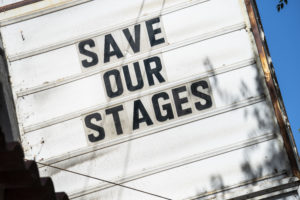
Photo by Erik Voake
I first spoke with Schaefer while Congress was in the session ending August 7. After that date passed—and nothing had been done—I asked her thoughts regarding the Congressional Session that runs from September 8 through October 2.
“We are still working hard, gaining more co-sponsors every day, and it feels like we have momentum,” she says. “But, of course, we don’t have a crystal ball. I wish I could tell you definitively what the future holds, but if I could, I’d be at the race track. We are still in the arena.”
These are contentious times, to put it mildly, but Schaefer retains a certain cautious optimism. “Congressional leadership and the White House will get back to the bargaining table. Once they have a deal, that’s when the language in the pieces of legislation we are supporting can get poured into it.”
“People who come to a show have dinner before or drinks afterwards. For every dollar spent on a ticket in a small venue, twelve dollars of economic activity is generated… The federal government assisting us is an investment—not just in keeping our industry from folding, but other businesses as well.” —Audrey Fix Schaefer, NIVA
And if there is no deal?
Dayna Frank, NIVA co-founder and CEO of Minneapolis’s First Avenue nightclub, pauses before answering this question. “There are no other plans,” Frank says. “We looked at it, we brainstormed and tried to come up with a plan B, C, or D, but no. There are ways to save individual venues, but this is a $10 billion problem and the only way to save the industry and [music] ecosystem as a whole is through the federal government.”
West Hollywood’s historic Troubadour nightclub is run by Christine Karayan, and has been in her family since the early 1980s. She admits that because of the market they’re in—and because of the club’s visibility and prominence—they’re not in as bad of shape as some others. Nevertheless, she says, “We’re going through the nest egg. I’ve shut off everything I can but I’m still cranking out X amount of dollars a month in rent and insurance. We’re probably OK ’til the end of the year. We’re not glitzy and shiny. We’re smelly and kind of old, what you see is what you get, and a lot of people appreciate it for the familiarity of it.
“If [one of the bills] gets through, then, yes, it will be beyond a sense of relief,” she continues. “You could, at that point, start to breathe. But I don’t know what day I can open the doors or when I can get up and running. Can I take on more debt than I have in place and drown myself?”
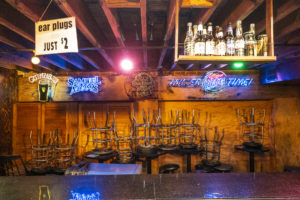
Photo by Erik Voake
Parks, the owner of xBk, has sunk her life savings into her club. “If there’s not some kind of package, RESTART or S.O.S., or some combination, we will not survive,” she says. “The other proposals out there [in front of Congress] don’t work for our industry. We’re not like restaurants that pop up and reopen. This [pandemic] could be years. We are the only industry that literally has zero revenue. I have to pay my mortgage, and the electric bill comes every month.”
“Live Nation and AEG have the money to wait it out, and all we’re gonna have is Live Nation and AEG,” muses J.J. Gonson, self-described “proprietrix” of the Somerville, Massachusetts club ONCE. “The world turned upside down and everything got handed to the bad guys. We’ve been inclusive and cooperative and caring of our community. Are we going to end up with nothing but corporate, hands-off booking?”

As the industry remains in a static, anxiety-fraught phase, Dayna Frank says some positives have surfaced. For one, the individual club owners feel less alone: “We’ve never been so connected and so communicative and had as much support among ourselves as we do right now.”
And, more generally, she adds, “The broader music industries are acknowledging what independent clubs mean to the industry as a whole. We’ve never seen that kind of tacit or overt support from Spotify, YouTube, BMI, ASCAP, Amazon Music. The whole industry is saying the independents are the root and the pillar of the music industry, and without our rooms the artists don’t discover their voice, don’t connect with their communities, can’t grow their fan base, can’t develop into global acts. When you create in the studio it’s an insular environment, but in a club, you get that crowd reaction, see what works. You need both the studio and the live environment.”
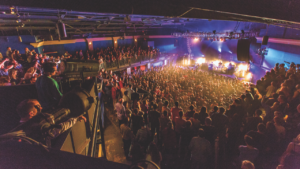
Photo by John Shore
But the openings of clubs and theaters won’t occur until deep into Phase 4 of the lifting of COVID-19 restrictions. Even if there is an effective and widespread vaccine available early next year—and audiences feel comfortable enough to mix and mingle in public again—tours will still have to be planned and those artists will still need places to play. Yes, the clubs owned and/or booked by deep-pocketed promoting giants Live Nation and AEG may survive; but for the myriad clubs and theaters that aren’t part of those chains, if they’re out of business, there’s no place for many of those bands to play.
“Not being able to put on a show is death,” says Michael Dorf, founder and CEO of the small City Winery chain. “And the live industry is one of the only avenues for musicians to earn a living, an incredibly valuable aspect that is at risk of extinction. The world goes nuts when a bald eagle’s nest is disrupted during a construction project, and I agree that’s important, but we’re talking about live music culture and it isn’t getting the attention.”
Dorf’s right. If you’re a musician, unless you’re Taylor Swift or Jay-Z, you’re most likely making your living by touring. “Touring is a huge part of my livelihood,” says Bethany Cosentino of Best Coast. “Not only is it how I make a large portion of my income, but it is also how I pay my employees. I don’t think people realize that bands are a business. We have a whole team of people around us who depend on us for their own livelihood, so losing the ability to tour in 2020 has impacted not just me, but the entirety of my business.”
“Live Nation and AEG have the money to wait it out, and all we’re gonna have is Live Nation and AEG. The world turned upside down and everything got handed to the bad guys. Are we going to end up with nothing but corporate, hands-off booking?” —J.J. Gonson, ONCE
In June, more than six hundred artists—including Dave Grohl, Billie Eilish, Brittany Howard, Willie Nelson, Lady Gaga, Neil Young, and Leon Bridges—signed a letter sent to Congress which read in part, “Independent venues give artists their start, often as the first stage most of us have played on. These venues were the first to close and will be the last to reopen… If these independent venues close forever, cities and towns across America will not only lose their cultural and entertainment hearts, but they will lose the engine that would otherwise be a driver of economic renewal for all the businesses that surround them.”
In early August, David Byrne joined the fight with an op-ed for the industry trade magazine Pollstar, in which he advocated for the passage of RESTART and Save Our Stages, as well as the ENCORES act that would create a tax credit for small live venues to help offset the costs of ticket refunds during the pandemic. “I’ve played a wide variety of venues,” he wrote, “and I came to realize that there’s a kind of ecosystem at work—the little clubs nurture the acts that will eventually play the 800-capacity clubs, and those in turn feed acts into the 1,500-capacity small theaters and ballrooms. Those venues support acts that will eventually play 2,500-seat theaters and carry their own crews and support. Each level feeds into the next. Musicians need each rung on this ladder to be in place in order to be able to reach the next one.”

Best Coast photo by Erik Voake
While many touring acts were derailed by the pandemic, emerging rapper MOZIAH was in another position. “Before COVID, I was actively researching ways to begin touring,” he says. “It was the best next move for engagement, exposure, networking, and income. The inability to play live forced my team and I to find alternate ways to accomplish these virtually. It was a big pivot for us and for many, many others.”
“People are finding new ways to release their music and are engaging with fans using all sorts of technology,” says Lili Trifilio of Beach Bunny and tiger lili. “I think the shutdown will have both a negative and positive effect on everyone participating. Even though there can’t be shows right now and so many musicians’ finances are negatively impacted, this space and time of uncertainty has also given way to new projects, new albums, and new inspirations. I predict that so much amazing music is to come out of this, as artists everywhere are continuing to write throughout the pandemic.”
The most popular non-touring alternative, of course, has been live-streaming, with artists either charging an admission or putting out a digital “tip jar.” On August 21, A Song For Joe—an all-star fundraising concert in celebration of the late Clash frontman Joe Strummer, featuring performances by Bruce Springsteen, Tom Morello, Bob Weir, and many others—was broadcast via The Joe Strummer Foundation’s website, with all donations benefiting Save Our Stages.

illuminati hotties photo by @cowboycrush
While it’s obviously better than nothing for artists and fans, the streaming option is, at best, merely OK. Sarah Tudzin, singer-songwriter of illuminati hotties, acknowledges streaming as one of the “many fulfilling ways to share music from afar,” but avers that “gathering in groups and partaking in art in real time is an irreplaceable human experience. Playing live has become integral to my career, and I’ve been fixated on how to fill that void for the foreseeable future.”
“One of the most fun things to do is not only creating art and writing songs, but performing them live,” says Phantogram’s Josh Carter. “Live shows, in person, in a crowd, with a buzzing energy is how it should be done. The spirit of live shows creates an energy and unity for people. It should be an experience.”
“We have a whole team of people around us who depend on us for their own livelihood, so losing the ability to tour in 2020 has impacted not just me, but the entirety of my business.” —Bethany Cosentino, Best Coast
“Truthfully, we’ll be seeing a new normal all over,” says MOZIAH. “Putting things on pause has made it clear that some stuff we have in place to support artists and venues in the music industry should be updated. The way we’ve done things thus far was born out of a need. Now there are new needs, which calls for new ways of doing things. It’s causes like these that serve to jumpstart that conversation.
“Streams and recordings are easily accessible and can be ripped nowadays, but there’s something still sacred about being in the same space as an artist. That experience has proven time and time again for centuries to be worth the ticket. Not preserving and supporting it is letting something truly valuable die off.”
“If 90 percent of independent live venues go out of business, that will likely create a monopoly of large corporate-owned venues that will have control over ticket rates, who gets to play, and how shows are held,” says Trifilio. “Larger venues certainly serve their purpose, but the independent ones are just as vital to the music industry as a whole, especially in terms of creating a space for emerging artists to thrive. I truly hope that all independent live venues get the funding necessary to stay open.”
“If we lose independent venues,” says Cosentino, “It will change everything about the music industry. It’s not something I’m totally ready to think about just yet.”
 How optimistic or pessimistic are club owners and musicians about the survival of these smaller venues? My research suggests that everyone is on a see-saw.
How optimistic or pessimistic are club owners and musicians about the survival of these smaller venues? My research suggests that everyone is on a see-saw.
“I’m cautiously optimistic,” says Austen Bailey, talent buyer for the Mohawk Austin club in Austin, Texas. “But we’ve gotta use the phrase ‘You can’t perform a transplant on a dead body.’”
“It depends on what day of the week you’re asking me,” says the Troubadour’s Karayan. “Today, I’m a little more optimistic overall. This will end at some point. But there’s no way you can open at a quarter capacity and have it make any financial sense.”
On a scale of one to ten—with total pessimism a one and complete optimism a ten—Robert Mercurio, co-owner of the historic New Orleans nightclub Tipitina’s, says, “My feelings of confidence go up and down. Today, I will say three. I watch the news and try to get a temperature of where Congress is at, and it’s a real tossup.”
Mercurio is in a somewhat unique position, too: Not only does he co-own a club, he’s also the bassist of the funk-rock band Galactic. “We own the club and are stewards of this historic venue, one of the most storied venues in New Orleans and a big part in the history of our band. We’re a band so we’re doubly hit, struggling on both sides. It’s been extremely difficult. It’s not like we have another day job.”
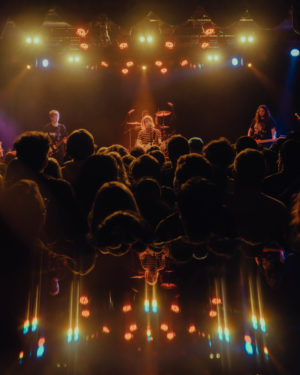
Beach Bunny by @deaniechen
Frank believes NIVA’s case is so strong it will transcend political bias. “It’s so blatantly obvious,” she says. “We are small, intimate spaces where people sing and talk, and you have a virus that kills people in small intimate spaces primarily by singing and talking. You’d be hard-pressed to find an industry that needs aid more than we do, especially independents who have no ancillary revenue, no corporate parents, and no other ways of getting cash right now.”
People have sent over a million emails to Congress in support, and on August 18, US Senate Minority Leader Chuck Schumer signed on as a co-sponsor of the Save Our Stages Act. “Independent venues, like theaters and concert halls, are the beating heart of New York’s cultural life and a driving force in the economy,” said the Senator in a prepared statement. “That’s why it’s so important to provide dedicated federal assistance to independent venues so when it is safe, we can gather again for music, comedy, theater and other live performances in venues that have been around for generations.”
“It’s not a red or blue issue,” says Schaefer, “but a green issue—helping business on Main Street, USA. It is a fight for survival right now. No sugarcoating it, we are on the precipice if we don’t get this help.” FL

